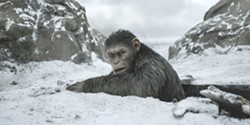
- Photo Courtesy Of 20th Century Fox
- THE FINAL BATTLE In War for the Planet of the Apes, one fight will determine the future of humans, apes, and the planet.
What's it rated? PG-13
What's it worth? Matinee
Where's it showing? Downtown Centre, Stadium 10, Fair Oaks, Park, Galaxy
Pick
Matt Reeves (The Pallbearer, Cloverfield, Let Me In) directs and co-writes with Mark Bomback (Live Free or Die Hard, The Wolverine) this third film in the rebooted series that is preceded by Rise of the Planet of the Apes (2011) and Dawn of the Planet of the Apes (2014). Commencing about two years after the events of Dawn, Caesar's (Andy Serkis) clan of apes is at war with a human military faction called Alpha-Omega led by a ruthless commander known as the Colonel (Woody Harrelson). The survival of each species is at stake.
Computer generated images and "performance capture" actor Andy Serkis are once again the stars of the show in what is essentially an anti-war movie in the vein of Platoon or Apocalypse Now. The technology on display is pretty amazing, with Caesar and the other ape characters delivering the sort of subtle facial expressions and complex emotions normally requiring actual human beings rather than computer generated animated constructs. It's not that I ever forgot I was looking at CGI, it's just that it's done so well I found myself fascinated by its quality.
Caesar wants nothing more than to live peacefully away from the remaining humans, who we discover are losing their ability to speak due to the simian virus. Harrelson's Colonel takes a page out of Brando's performance as Kurtz from Apocalypse Now—a man gone crazy by war who believes he's the only one with the mental clarity to see the truth, in his case, the belief than humans who can't speak are no longer human and must be exterminated before they can spread their affliction.
In short, humans are losing their humanity simultaneously as apes are gaining theirs. Naturally we're rooting for Caesar in the face of the Colonel's merciless worldview, and the film gets its heart and soul from the idea that he can behave more humanely than the humans he encounters. Yet, even Caesar struggles to overcome his baser instincts. He's haunted by nightmares of Koba, a gorilla from Dawn of the Planets of the Apes that succumbed to his dark side. Likewise, Caesar finds himself consumed by hatred after so many of his clan—including family members—are murdered by the Colonel. Much of the film is about his own internal struggle to do the right thing.
It's a very human and moral story, an allegory about a world gone mad, consumed with hatred, a world at war with difference—where intolerance and a refusal to coexist threatens to burn everything to the ground. At two hours and 20 minutes, it's a bit overloaded, but for a blockbuster franchise, it avoids the pitfalls of the Pirates of the Caribbean and Transformers franchises by actually trying to expand its message rather than merely repeating it ad nauseam. (140 min.)
—Glen Starkey
Comments